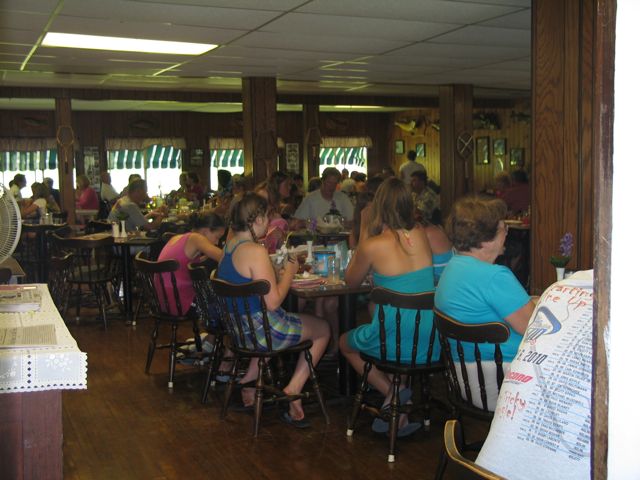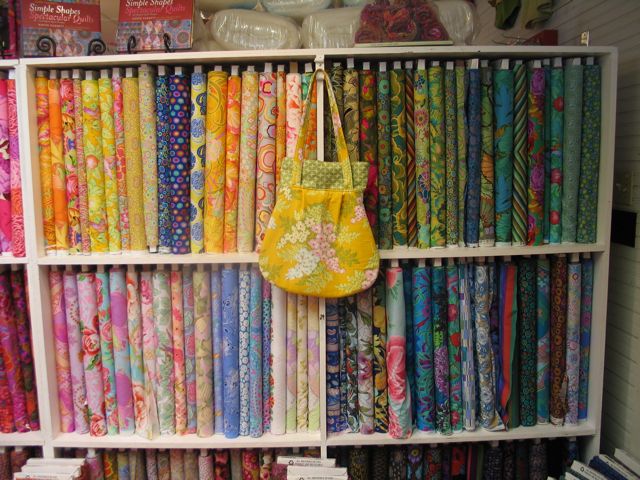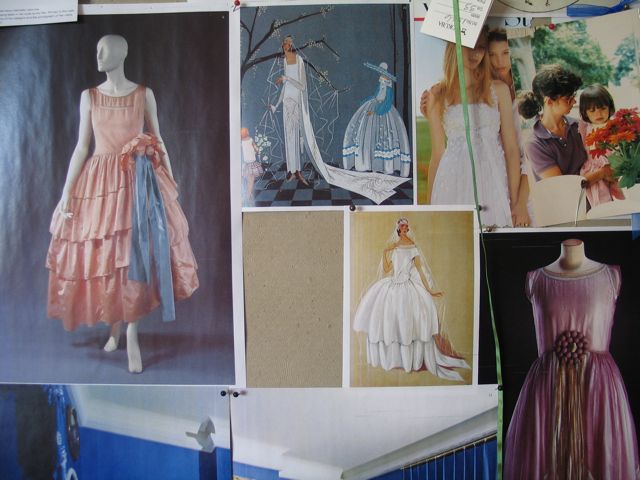A Road Trip in Maine
The trips my husband, Richard Cramer, and I like to take are ones where we have a stake in the places we visit. It could be nostalgia -- like visiting an old stomping ground -- or it could be following an interest in life -- like food or art. We are both artists, so travel always includes museums. But you never know where you will find an artful experience outside of museum walls.
Last summer we followed our whims to Maine. Flying in and out of Portland, where we rented a car, was easy enough from New York City where we live.
We began our stay in Portland with a lunch of oysters, lobster rolls and beer at J’s Oyster in the Old Port. We unashamedly ate lobster at every meal except breakfast. Our proximity to Penobscot Bay, the nation’s richest lobster ground, ensured the presence of a lobster tank in even the most obscure general stores and filling stations.
After a night at the Holiday Inn by the Bay, we began our drive to our first stop, Belgrade Lakes. We were going to pursue our twin loves of food and France with a visit to Brenda and Tanya Athanus, owners of a food store called The Green Spot in Oakland and to relive a slice of family history with a stop at Bear Spring Camps.
Brenda Athanus in The Green Spot with a selection of French wines.
Tanya Athanus assisting a customer.
How I found The Green Spot revolves around my love of things French, a reading list, and Google. Last summer I was binging on books about France. Novels, cookbooks, chick-lit -- you name it. One book I found was When French Women Cook: A Gastronomic Memoir by Madeleine Kamman. Ms. Kamman, who was born in France, learned to cook from the great women cooks in her family. In 1960 she married an American and moved to the United States, and in 1971, she opened a cooking school, Modern Gourmet, in Massachusetts.
Prepared salads and pickled foods at The Green Spot.
The ubiquitous lobster tank.
I had never heard of Madeleine Kamman, so I turned to my search engine “One Thing Leads to Another,” aka Google. That’s where I found a post on Amy Ephron’s blog, “One for the Table,” by Brenda Athanus. According to her post, Brenda wanted to take Ms. Kamman’s chef course but, in order to qualify, she had to make a génoise cake with a butter cream frosting. Not knowing that a génoise is supposed to be a low-rising cake, Brenda kept trying to make her cake rise higher. She made six génoises for Ms. Kamman’s approval. Brenda got in the course and said, “It changed my life.”
A charming tableau on a shelf at The Green Spot.
When we arrived at The Green Spot I was surprised to see that it’s really a farm stand on a highway. But a farm stand with French wines, artisanal cheeses, lobsters, magret de canard and ice cream like you get in Paris? Tanya was behind a counter crowded with bottles of Lillet, local fraises des bois and fragrant raspberries.. Brenda, her blond hair pulled back in a chignon and wearing a blue and white striped mariner tee and French-style apron, emerged from her kitchen to greet us. Brenda and Tanya have had their store for 35 years. It started as a summer job, but they had such a good time that first year that they stayed. “We wanted to provide good food, eggs, real butter -- just good clean food,” said Brenda.
Produce is invitingly arranged in wooden wine crates in a cheery room painted sunshine-yellow. Brenda says, “I like to buy from local farmers who have produce that glows. I feel that if it is well raised, it has more vitamins. The French always have one foot on the farm, and so do I.”
A trip to Paris each year is de rigueur for Brenda and Tanya where they attend the Salon International de l’Agriculture to look for new products. Brenda has been taste-testing Berthillon ice cream, known as the best in Paris, for 20 years and makes her own version. She believes her ice cream’s base is similar to that of Berthillon’s, but says, “Normandy cream is the best in the world, so my ice cream will never be seamless. It’s all in the ingredients.” Among her flavors are lime, creamsicle and her wildest -- curry cashew.
The Green Spot’s meat and seafood case holds veal chops, pork chops on the bone, magret de canard, Angus rib eye steak and oysters. Tanya raises chickens which are also available.
Wines both “old-world and new,” as Brenda describes them, occupy a corner of the store. You can pair these with Brenda’s homemade take-out foods and finish your meal with a fresh-from-the-oven fruit pie.
We purchased two salads, an excellent French Bordeaux, the little strawberries, a box of raspberries and coconut macaroons, with an eye toward dinner at our inn that night.
Reliving a Childhood Vacation
Driving west from The Green Spot, we headed to our second stop, Bear Spring Camps. The Belgrade Lakes Region Business Group touts the area as one “Where memories last a lifetime.” They don’t know how true that is for my family.
In 1957, my father and mother, Sam and Mary Markel, packed us in to our Chrysler station wagon, and drove from our home in Sea Cliff, Long Island to Bear Spring Camps located on the Great Pond. When I told my sister, Susan, that I was going to Belgrade Lakes, she asked, “You're going to Bear Spring Camps?” She remembered the name of the place. She was 11, my brother, David was 6, and I was 13 when we made the trip. My sister, Jeanne, was with us too -- in utero.
The main lodge and dining hall at Bear Springs Camps hasn't changed in 50 years.
Old memories came flooding back. Susan: “I was out on the lake with Sam during a thunderstorm, and it was scary. I rode a one-eyed horse, went on a hay ride, and we went to a square dance.” David: “I caught a fish, and the cook prepared it for our dinner. We played Kick the Can and Snake in the Lake.” Me: I played ping pong in the recreation hall with a boy.” David: “I had the time of my life.”
Guests tuck into their lunch in the dining hall.
I found Bear Spring Camps looking a lot like it did 54 years ago. It was lunchtime, so guests in the Main House’s pine-paneled dining room decorated with taxidermy fish and elk, were tucking into a lunch of turkey and fixings and blueberry pie. Chatting with people relaxing in rockers on the front porch, we learned that some had been coming to Bear Spring each summer for 50 years.
As I walked down the road to the lake, I could feel the warm spirit of my parents from that long-ago time. Rustic, dark-brown cottages, their porch railings draped with beach towels, wet bathing suits and inflatable rafts, edged the lake.
Bear Spring Camps was started by George and Alice Mosher in 1911. They built six cottages and converted a wood shed into a dining room. Families from Boston and New York traveled by train and were picked up at the Belgrade depot. Today, Bear Spring is run by the family’s third generation, granddaughter Peggy and her husband, Ron Churchill. They have 32 cottages and activities like boating, fishing, swimming, archery and golf. Or you can “do a whole lot of nothing,” as I heard one woman say as she walked to her cottage, a slice of blueberry pie in each hand. “We don’t do hay rides or dances any more,” says Mr. Churchill, “but that about all that’s changed.” All except that one-eyed horse who is long gone, hopefully not to the glue factory.
There's a whole lot of tranquility in Maine. The Great Pond at Bear Spring Camps.
Casting About in Castine
Leaving Belgrade Lakes, we headed east to the coast. Our destination was Castine, one of the oldest towns in New England, on a peninsula in Penobscot Bay.
Castine was the capital of Acadia, a French territory, from 1670 to 1674. It was founded by Jean-Vincent d'Abbadie de Saint-Castin, a fine French name if I ever heard one.
A stand of Queen Anne's Lace.
The air in Castine is so pure that you feel completely rejuvenated.
It's a spa for the mind.
Castine is quiet. No Fresh Direct trucks idling
outside your window on a Sunday morning.
The porch at The Castine Inn.
The view from our room at The Castine Inn.
A lovely bedside lamp in our room.
One of the highlights of The Castine Inn is a mural depicting the Castine Peninsula in the dining room.
The mural is by Margaret Parker and was completed in 1989.
"When I bought the Castine Inn in 1984, the dining room seemed like a perfect place for a mural but 5 years passed before I was sure of the composition and had time to paint it. The murals of Rufus Porter, painted in the 1800s inspired the simplified motif of trees, water and islands. In the early spring of 1989 I set to work sketching the town. Scale drawings were made of each wall. Rosco Scenic Paint was used, a water base similar to tempera that dries quickly and is used in theatre.
I learned this painting technique from working in the theatre in New York where I trained at the Polokov School of Theatrical Design. In the mural I hoped to share my love for the varied habitats of this tiny peninsula: dense evergreen forests, ocean shores, tidal flats, and the colonial town with its giant elms and the people who live here." Margaret Parker
Nothing Ailing at Alewives,
a Most Wonderful Fabric Store
Alewives is a fabric store in the small, historic town of Damariscotta Mills, Maine. The store is owned by Barbara Neeson and managed by her daughter, Rhea Daiute. It features an eclectic mix of fabrics and contemporary and vintage designs.
I was like a kid in a candy store (or a grown-up who loves color and pattern in a fabric store) at Alewives. The name, by the way, derives from the name of the Alewive fish which makes an annual migration to a waterfall near the store.
Alewives offers quilting and sewing classes, patterns, yarns, kits and notions.
Sample garments made with Alewives fabrics.
I hope you have enjoyed this visit to Maine.
Bon été!











































































































